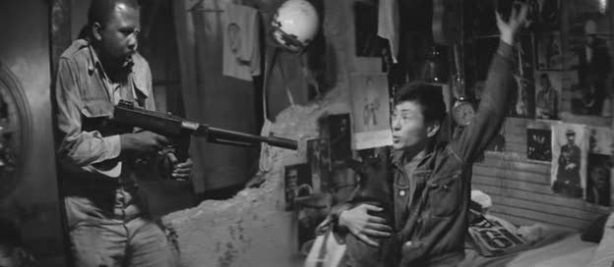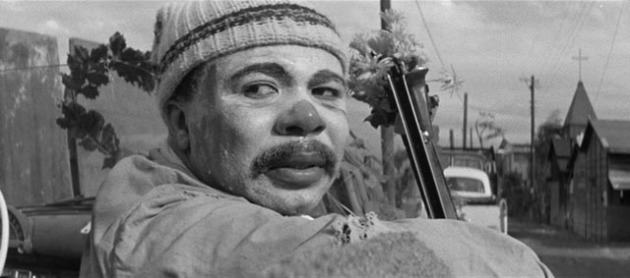Re-blogged from JapanCinema.net
Kurahara’s Black Sun is the often riveting and frequently odd story of Mei, a young Japanese wastrel and squatter (and jazz lover), and Gil, a wounded black American sergeant who is on the run. The two have nothing in common: no language, no culture, no values, no views, no musical tastes. Incredulous that a black man would be ignorant of jazz, at one point Mei shouts at Gil, “You don’t like jazz. You can’t play the trumpet. You can’t even sing.” But they become unlikely companions in a movie that moves from radical cross-cultural misunderstanding and overt racism to a strange kind of brotherhood and compassion.
“Black Sun” is the title of a Max Roach album that Mei buys at the beginning of the film. The film features music by The Max Roach Quartet, and indeed starts as an homage to jazz. Kurahara’s cinematography is an explicit counterpoint to a thrilling soundtrack. The disruptive camera work and fast cuts destabilize and provide a rough visual approximation of jazz rhythms. The film is off-beat and improvisational, a visual syncopation of unexpected camera angles, alternating fixed and moving cameras, and dizzying tracking. American jazz was the soundtrack for the marginal counterculture in Japan during the early 1960s, and Mei is an adoring fan. This is the underside of Japan’s burgeoning economic miracle, a postwar Japan of desolate ruins and rubble, not a sleek, modernized, and rebuilt Tokyo metropolis. Jazz represented a freedom from the strictures of traditional Japanese society, and in Black Sun Kurahara was trying to give voice to this desire in the medium of film.
The recurrent theme in Black Sun is the Japanese racism laid bare by their encounter with American black GIs in the postwar era. Mei is a voice for the gross simplifications of the time: you must like jazz if you are black, black Americans are emotional and animalistic, etc. At times Mei’s racism is painful to watch. When Gil writhes in pain from a bullet wound, Mei is oblivious and asks him to play the trumpet. When Mei decides Gil is not a real negro because he doesn’t embody jazz, the only other category Mei has for him is slave. “I got myself a slave today,” he will proudly proclaim to his friends at a jazz bar. For a time Black Sun turns surreal. After seizing his machine gun, Mei paints Gil in whiteface and drives around with Gil now playing a trumpet (badly) wearing a hat of ridiculous tropical foliage while he himself wears blackface. (No, really, I’m not making this up.) Dressed up, humiliated, made to dance, to play the trumpet, he is reduced to a figure that shows us a Japanese public reveling in the racist spectacle of a buffoonish black man. At his lowest, Gil has flashbacks of the civil rights movement in the U.S., a struggle for equality which Kurahara clearly sees as utterly missing in Japan.
And if this is not material enough, Kurahara also laces the film with Christian iconography. Mei’s squatter home is the ruins of an abandoned church, and the film is filled with close-ups and lingering takes of crosses, stained glass, statues of Mary, church bells, and crucifixes. We even see Mei crossing himself while burying his dog Thelonious Monk. For Gil these familiar icons offer hope of deliverance, but I wonder if Kurahara wants to show us a world where faith no longer seems to have a place. In the end, however, Mei sees Gil as a real person, and as he helps Gil walk, his wounded leg now festering, the camera lingers on the contrasting skin of Mei’s hand grasping Gil’s wrist. The machine gun that each turned on the other is left behind now, forgotten and unnecessary. There are haunting, beautiful, moving scenes of Mei tending to Gil’s wound. Compassion and brotherhood are found in unlikely places. But just as you begin to get comfortable and think “Aha!” Kurahara leaves you flatfooted. In the final bizarre scene Gil floats off over the sea and toward the sun (thus forming the other black sun from the film’s title) hanging onto a balloon after Mei shoots the rope, freeing Gil from the crucifixion rope-bonds holding him down. Redemption? Deliverance? Understanding? You make the call.![]()


